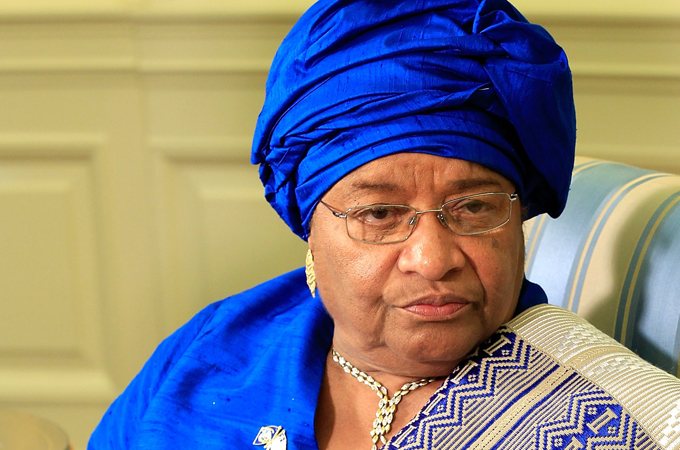Even before Ebola began to ravage Liberia, the country didn’t have nearly enough doctors to treat its population. Since the beginning of the deadly outbreak, that number has been dwindling: some doctors working with Ebola patients have died, while others have left the country altogether.
Among those staying away: Dr. James A. Sirleaf, who happens to be the son of Liberian President Ellen Johnson Sirleaf.
That revelation has caused some outrage, at least at the symbolic level, especially after President Sirleaf pleaded for more medical aid on Sunday. “The virus has been able to spread so rapidly because of the insufficient strength of the emergency, medical and military services that remain under-resourced,” she said in a letter to the world. “This fight requires a commitment from every nation that has the capacity to help, whether that is with emergency funds, medical supplies or clinical expertise … It is the duty of all of us.”
Sirleaf’s youngest son is a physician who works in Georgia. On Monday, the Wall Street Journal noted that in August, his mother “fired state officials who refused to come home from abroad to help Liberia battle Ebola.”
Unlike those fired officials, James Sirleaf does not work for the Liberian government. He works for an American hospital and has lived in the United States for about 30 years, according to the Connecticut Post.
Speaking to the Journal, Sirleaf, who is 51, explained why he will not be moving back to Liberia in the middle of the deadliest Ebola outbreak in history: “The symbolism of me going there and potentially getting Ebola when I have a 9- and a 7-year-old at home isn’t worth it just to appease people. I’ve made a commitment not to live in Liberia for many reasons, and I think my contribution means more.”
That contribution includes shipping protective gear to workers in the country, although it seems Sirleaf has scaled back his ongoing contributions to Liberia’s medical system as the epidemic worsened. Earlier this year, he halted his non-profit Health Education and Relief Through Training program, which has been sending doctors to Liberia for a month at a time to teach in the country’s medical school.
That, too, is a decision Sirleaf is willing to defend: “I’ve lost friends to Ebola,” he told the Journal. “I can’t see the wisdom in sending unspecialized American volunteers to face that risk.”
Sirleaf’s decision to remain in the United States is emblematic of a particularly difficult problem for health workers and other officials trying to stem the epidemic in Africa.
“We need doctors,” World Health Organization spokesperson Daniel Epstein told The Post on Monday. “We need lots of them.”
Many Liberians who become doctors go abroad and stay there to find work. Even before the Ebola epidemic, being a doctor in Liberia was an extraordinarily difficult line of work.
As The Post reported earlier this month, Liberian doctors working in the country’s Ebola wards earn their living from the health ministry there – about $1,500 a month.
“Being a Liberian doctor has always meant being tasked with the impossible,” The Post’s Kevin Sieff wrote, describing the lack of personnel, supplies and facilities characteristic of the country’s medical system on a good day.
The argument against Sirleaf returning to Liberia to treat Ebola patients boils down to a few points: He does not live in Liberia and has not for some time. He is not an epidemiologist and does not specialize in treating tropical diseases such as Ebola.
His mother serves as the leader of Liberia, not him. He has young children, and doctors who work on the front lines of the Ebola epidemic in West Africa are at real risk of losing their lives: Through Oct. 12, 209 health-care workers had been infected with Ebola in Liberia, according to the WHO; 96 of them died.
“We want them to come and help,” Billy C. Johnson, chief medical officer at Monrovia’s John F. Kennedy Medical Center, told the Journal. “But how can you ask someone to jump into a fire? You can’t guarantee their safety.”
Still, it’s easy to see why Sirleaf’s personal decision has attracted public interest. Doctors Without Borders, which has led the effort to bring physicians into Ebola stricken areas, writes on its site that it needs specialists in diseases as well as ER doctors like Sirleaf. In other words: If Sirleaf volunteered, there would be use for his skills.
Epstein told The Post that the WHO is recruiting doctors, regardless of nationality, “with experience in infectious diseases, as well as logicians and other specialists.” The organization is building 40 new Ebola treatment centers. Each one needs 200 Liberian medical workers and 25 international staff to be operational.
He estimates that his organization alone needs more than 1,000 additional international staff, mostly for short-term commitments of six months to a year.
In the end, however, Sirleaf is correct that any decision he might make to return to Liberia would primarily wield symbolic power. This is why he is being singled out, not for his expertise.
But those working to populate Liberia’s hospitals with more doctors might not be so quick to dismiss the power of that symbolism: Those facilities still remain empty, even as officials try just about everything they can to fill them with qualified staff.
President Sirleaf was not available to comment about her son, her spokesman told the Journal.
–
Source: Washington Post




